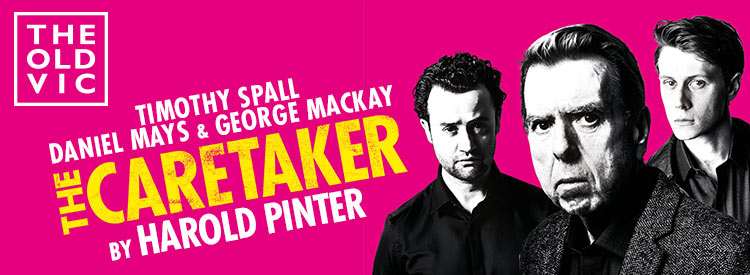“The Caretaker, on the face of it, is everything I hate most in the theatre: squalor, lack of action etc. But it seizes hold of you. Nothing happens but somehow it does. The writing is at moments brilliant and quite unlike anyone else’s” – Noel Coward, writing in his diary in 1960 after seeing The Caretaker
The new Old Vic season is in full swing, post-Spacey and in the safe hands of new Artistic Director Matthew Warchus. We have the heavyweights (Ibsen, O’Neill), the crowdpleasers (the musical version of Groundhog Day) and even dance (Jekyll & Hyde) among others, but it was a major coup to revive Pinter‘s The Caretaker with Timothy Spall as the eponymous Davies, directed by the self same Warchus.
Spall is maybe a perfect actor to articulate the inner miseries of Pinter characters. One of those ubiquitous, versatile and much loved British character actors, he possesses a face of great mobility, yet so familiar he can turn up in any guise without disappointing his audience. Younger fans will remember him in the Harry Potter franchise, while we oldies enjoyed his turn as the grumpy artist Mr Turner. Spall may not be blessed by nature with physical beauty, but his acting technique is undeniably effective. Not so long ago he was dangerously ill but thankfully survived and now looks much slimmer than the slightly podgy actor of yore, remembering how he looked in Auf Wiedersehen, Pet and other earlier roles. His skill as an actor is still blossoming, of which more anon.
This is a play I’ve seen at least three times before, such that it is rapidly becoming an English standard. It follows a very successful recent outing to see The Homecoming. In fact, the older I get the more I appreciate the power of Pinter and indeed all darkly comic plays where the words spoken convey much less than the meaning and emotion. The play nods to Beckett‘s Waiting For Godot in its exposition of power-distance relationships, though the concept of bizarre ménage a trois has been used successfully many times.
I thought of Joe Orton‘s Entertaining Mr Sloane, where the newcomer uses sex as a weapon to divide a brother and sister. In The Caretaker it is not sex that drives conflict but ultimately the looming presence of the decaying house and the arrival of the tramp Davies that ultimately creates a dynamic in the almost unspoken relationship between brothers Mick and Aston.
If you want to understand planet Pinter, consider these words from writer John Lahr about The Homecoming:
“Before the play I thought words were just vessels of meaning; after it I saw them as weapons of defence. Before, I thought theatre was about the spoken; after, I understood the eloquence of the unspoken. The position of a chair, the length of a pause, the choice of a gesture, I realised, could convey volumes.”
As we arrived, the sense of bleakness pervaded the theatre, courtesy of a brilliant onstage illusion. There appeared to be a brick wall set at an obtuse angle, with rain falling constantly from the lighting rig above. That water was not cascading down on to the stage was the only way you knew it was not real. Trompe L’oeuil but with a gripping purpose, foretelling maybe the most darkly grim telling of the Caretaker yet.
As the wall rose, the stage appeared in the nether distance, then moved forwards as if a camera was panning in, until the audience was virtually there in the squalid junk-laden attic room with the cast. The effect is to emphasise the claustrophobic nature of the room, such that we notice every nuance of Rob Howell‘s set. This is designer seedy: holes in the walls, leaks from the roof, peeling wallpaper festooned with damp, newspapers piled in one corner, junk placed with casual deliberation, and constant rain falling beyond the only window. Never was Pinter’s vision of the set so vividly and austerely reconstructed.
As the stage comes forward and lights come up, we see George Mackay‘s Mick, sitting downstage. He is sharp, sleekly slender – almost fragile. Dressed in black with a black leather jacket with hair smoothed back, this Mick is strangely effete but no less menacing and aggressive. He looks at us curiously, but hearing sounds vanishes from the room, allowing Daniel Mays‘s Aston to bring on the tramp, Davies. Mick returns in Act 2 to confront the tramp. When he speaks it is at 90mph, though mostly he is silent and moody, almost obtuse. Unlike his brother, Mick chooses to keep his own counsel because he does not trust anyone, not even Aston.
As I expect was intended, Aston reminds me strongly of Jack Nance‘s character in the David Lynch film Eraserhead, with shaven temples but a billowing dark quiff above. That was a nightmarish movie with things happening to the character he could barely understand, but so it is with Aston. On the face of it, he is kind, gentle, has plenty of good intentions but his here and now is dominated by fixing a plug that does not need fixing, and planning to build a shed to house his workshop, without which his plans for improving the house cannot be launched.
Each character has an intention that is never realised. Davies is forever waiting for the weather to break and to get a good pair of shoes so he can go to Sidcup to collect his papers and references; he never gets there. Mick’s vision is an incredibly detailed house makeover to turn the place into a palace fit for him and his brother, never realised. But nothing ever happens, ever changes; everything stays the same.
Each could be said to possess a mental disorder too, though only Aston admits to it. Mays handles Aston’s monologue on his ECT with poise and dignity, but only because at that moment the world fades out and he is alone. The words of Kenneth Cranham’s on Pinter’s direction of this play, quoted in the programme, seem apt:
“When I played Aston in The Caretaker, he said to me, ‘At the beginning of this play, Aston hasn’t talked to anyone for 10 years. By the end of it, he won’t talk to anyone for another 20.'”
In that context, Aston’s behaviour makes perfect sense. Mays captures the presence of a man on the brink of extremes of loneliness and, as viewed by the world, madness. But ECT has made him more withdrawn.
Spall’s Davies looks like a tramp nearing the end of his tether. His face, beard and rangy hair look unkempt and his face weathered from life on the road, but his waistcoat speaks of better times – maybe a home and a family, though neither are mentioned. He is mannered, mutters to himself constantly as if in conversation with an invisible voice; he makes grand sweeping gestures as if he owned the place; everything is below the dignity of a man of his station.
Davies, going by the name of Jenkins, presumably to escape the attentions of someone threatening, insinuates himself into the lives of the brothers by constant wheedling and whining, trying to sound important without ever doing anything. His speech is littered with self-aggrandisement, lies and half-truths. Only when he feels threatened, ironically, does he shrink back and open up.
This is a masterly telling by all three actors, since Pinter can only truly work as an ensemble rather a star vehicle – the Caretaker is not a place for egos or heroes, only victims whose lives are gaping and vacuous. Spall is magnificent, and matched by Mays and Mackay in turn; but the most magical moment comes right at the end, as Aston shakes Mick’s hand and puts a brotherly hand on his shoulder. That moment alone is worth a thousand words, as eloquent as wordless gesture can be, and a flamboyantly Pinteresque moment. I urge you to watch while there is time.
***** stars.













